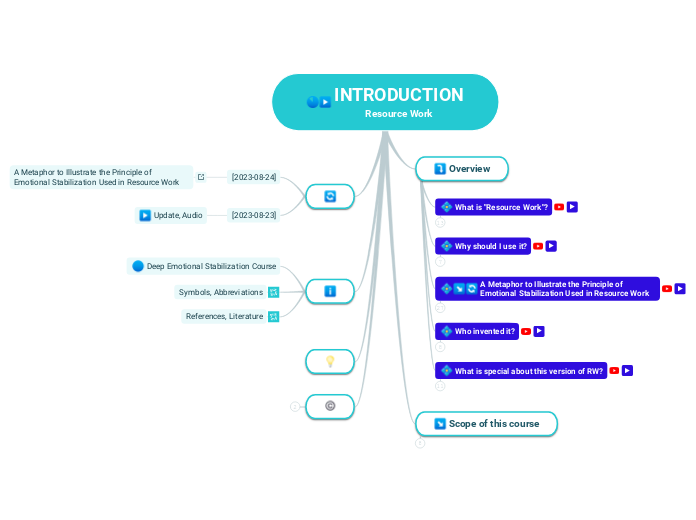av Medizin Wissen 2 år siden
319
INTRODUCTION Resource Work

av Medizin Wissen 2 år siden
319

Mer som dette
Resource Categories
Dr. Baltrusch and MB co-founded a non-profit organization and ran it together from 2014 to 2020. They have conducted numerous trainings on the treatment of emotional trauma in several countries.
Dr. Baltrusch
A summary of Baltrusch's work was published in 2021 [1].
Efficient Trauma Work is Possible - Tribute to Dr. Charlotte Baltrusch
About MB
Another umbrella term associated with RW is "imaginary techniques." This term includes all techniques that utilize one's imagination with real or fictitious situations for emotional work.
In specialized literature, this falls under the umbrella term "stabilization techniques." These encompass various approaches and other methods.
Emotional caregivers also applied it to care receivers who were not intuitive about it and needed help getting started.
Credit for the original "idea" goes first to the survivors themselves!
The Origin of Techniques for Emotional Work, Resilience, Trauma are the Survivors
With Resource Work, you are about to discover one of several methods that use this principle. It will probably change the way you see things, the way you work, and what you thought was possible.
Poets and writers often study the human condition and can provide valuable insights. However, their profession does not typically provide practical solutions for taking purposeful action that produces consistent results. That is our job!
>>
When applied to human nature, these simple words contain a powerful truth. This truth must inform the principles of emotional work if it is to be effective.
This "truth" is true because of what we can observe in reality, not because of what the metaphor says.
"... only ..."
"Light" is not only an effective remedy - it is the only truly effective remedy that I know of.
That means, if you don't use a method that utilizes this mechanism, you'll never have a chance to overcome distressing emotions and trauma.
What "Light" means:
"Light," like the metaphorical "rainbows" in Angelou's writing, represents any experience in life that elicits positive emotions, such as safety or happiness.
key phrase:
Darkness can only be overcome by light.
Paulo Coelho uses this metaphor when he speaks of the "Warrior of Light".
Maya Angelou popularized a metaphor involving "rainbows" in the "clouds." Her language urges action, saying, "Become a rainbow in someone else's cloud."
This is the most powerful approach to keep the darkness at bay.
You can and should strive to be able to do exactly that: to become someone who can re-connect others with their own rainbows, their own light that they already carry but often have forgotten.
By using a metaphor, we are not tapping into esoteric ways of explaining reality. We use the metaphor to understand an underlying principle for a science-based intervention.
Terms such as light, energy and healing are often used with very different meanings and frameworks, including esoteric ones.
Metaphors can tap into a pre-existing framework for understanding a matter and its inner workings.
Metaphors can improve and facilitate the understanding of concepts.
In other words, and going one step further, if you do not have an effective method of emotional stabilization, you have no business working with traumatized people - at least not with their trauma specifically.
Emotional Trauma
As such, RW can be learned and applied as ...
... as part of the DEW System.
... a method combined with other techniques you already have;
... a standalone method;
Emotional Processing
Emotional Stabilization
Trance
Guided Imagery